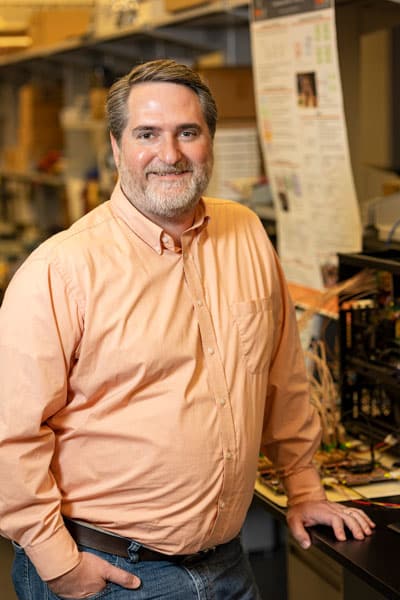Rose Selected EECS Department Head

Professor and Associate Department Head Garrett Rose has been selected as the new head of the Min H. Kao Department of Electrical Engineering and Computer Science, effective August 1.
Leon Tolbert has been serving as the interim department head since June 1, 2023.
“I am excited to step into this leadership position for EECS, a department that has been very good to me through the years,” Rose said. “I may be biased, but I feel the faculty, students, and staff who define the department are top notch, as good as one will find anywhere. It is truly humbling to be placed into this position where I get to work side by side with such excellent people as we determine the next chapter for EECS.”
Rose’s research is in the area of very large-scale integration (VLSI) and includes explorations in memristors and memristive systems, emerging nanoelectronic computer architectures, hardware security and security implications of emerging computing systems, and neuromorphic computing. Since joining UT, he has been PI or Co-PI on a number of research projects receiving a total of over $9 million in external funding. Through his career, he has published over 150 works in peer-reviewed journals and conference proceedings.
Prior to joining UT in 2014, Rose was a senior electronics engineer with the Air Force Research Laboratory (AFRL), Information Directorate, where he led a variety of research efforts in areas of hardware security and nanocomputing. From 2006-2011, Rose was an assistant professor in the Department of Electrical and Computer Engineering at the Polytechnic Institute of New York University.
“I am excited for Dr. Rose to join the college leadership team,” Dean and Wayne T. Davis Chair of the college Matthew Mench said. “He truly loves the department and college, and I have great confidence in his ability to lead the EECS department forward. The faculty in EECS stand squarely behind him, and I anticipate some great things in the future under his leadership. I also want to thank Dr. Leon Tolbert for stepping up as interim department head for a year during this search. He has been a wonderful team member and advocate for EECS, and I am very grateful for his dedication to the department.”
Rose received his bachelor’s degree in computer engineering from Virginia Tech in 2001. He earned his master’s and PhD in electrical engineering from the University of Virginia. His PhD dissertation was on the topic of circuit design methodologies for molecular electronic circuits and computing architectures.
Rose is a member of the Association of Computing Machinery, IEEE Circuits and Systems Society, and IEEE Computer Society. He serves and has served on technical program committees for several ACM and IEEE conferences (including ISVLSI, GLSVLSI, NANOARCH, ICONS, HOST, and DAC) and workshops in VLSI design. He has twice served as a guest editor for special issues of the ACM Journal of Emerging Technologies in Computing Systems, encouraging the dissemination of works in nanoelectronic circuit design and neuromorphic computing. In 2018, he was a guest editor for a special issue of IET Computers & Digital Techniques focused on hardware-assisted techniques for computer security. From 2014 through 2017, he was an associate editor for IEEE Transactions on Nanotechnology.
Rose and his collaborators, the lead PIs of the TENNLab Neuromorphic Computing research group, received the TCE Award for Translational Research as a team in 2024. He also received the college’s Professional Promise in Research Award in 2018, and the AFRL/RI Research and Technology Team Award in 2014. He earned a Notable Achievement Award in 2012 for patent application 13/506,856 “Electronic charge Sharing CMOS-Memristor Neural Circuit,” and was a nominee for the AFRL Early Career Award prior to moving to UT.
In 2023, Rose was named the recipient of the TCE Charles and Julie Wharton Engineering Faculty Award and earned the title Wharton Engineering Faculty Awardee in recognition of his accomplishments in scholarship and research.
“Over these last few years, we’ve seen tremendous growth in areas such as machine learning and artificial intelligence, as evidenced by efforts to expand AI-related initiatives around campus. Certainly, EECS and TCE will continue to play a major role in providing opportunities for students and faculty to explore AI and related fields,” Rose said. “I also anticipate further demands for growth across several other fields of electrical engineering, computer engineering, and computer science. These are exciting times and I look forward to working with the EECS community to serve the needs of our students and the people of Tennessee in the best way possible.”
Contact
Rhiannon Potkey (865-974-0683, rpotkey@utk.edu)